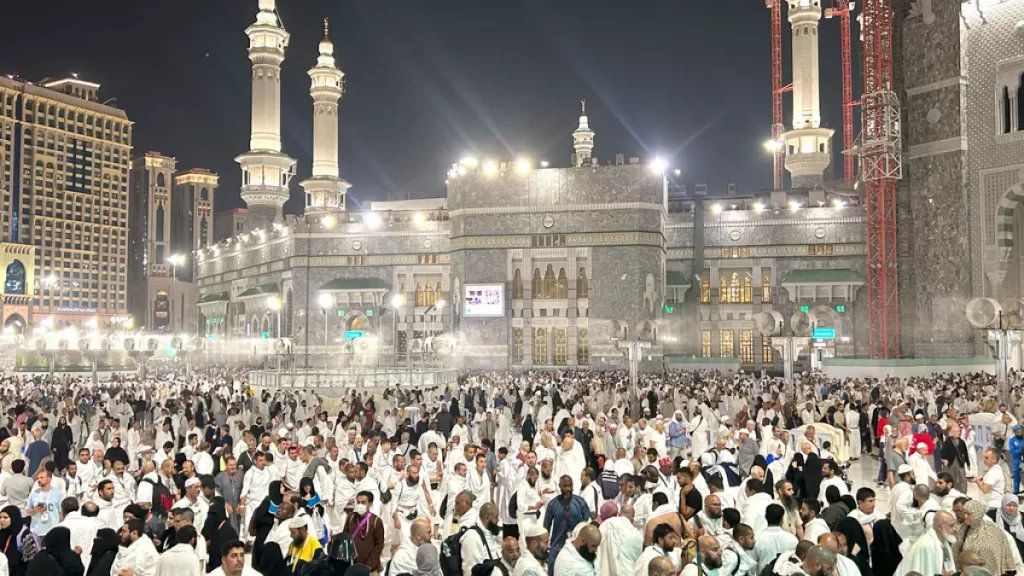Hajj, the annual Islamic pilgrimage to Mecca, is a deeply spiritual and communal experience for Muslims around the world. It is a time for believers to come together in unity, humility, and devotion to Allah. The importance of community during Hajj cannot be overstated, as it is a time for pilgrims to support and uplift one another on their journey of faith. The sense of togetherness and solidarity that comes from being part of a larger community of believers is a fundamental aspect of the Hajj experience.
The significance of community during Hajj is rooted in the teachings of Islam, which emphasize the importance of unity and brotherhood among believers. The Prophet Muhammad himself emphasized the importance of community and solidarity, stating that “The believers in their mutual kindness, compassion, and sympathy are just like one body. When any part of the body suffers, the whole body feels pain.” This teaching underscores the idea that the well-being of each individual pilgrim is interconnected with the well-being of the entire community. As such, the Hajj experience is not just a personal journey of faith, but a collective endeavor that requires mutual support and cooperation among fellow pilgrims.
Building Connections with Other American Pilgrims
For American pilgrims embarking on the Hajj journey, building connections with fellow travelers from the same country can be a source of comfort and support. The shared experience of being in a foreign land for such a significant spiritual undertaking can create a strong bond among American pilgrims. This sense of camaraderie can help alleviate feelings of homesickness and isolation, as well as provide a sense of familiarity and belonging in an unfamiliar environment.
Connecting with other American pilgrims during Hajj can also provide a valuable opportunity for cultural exchange and mutual understanding. Pilgrims from different regions of the United States may have diverse backgrounds, traditions, and perspectives, and coming together during Hajj allows for the sharing of these experiences. This exchange can foster a sense of unity and solidarity among American pilgrims, as they come to appreciate the diversity within their own community and gain a deeper understanding of their shared faith.
Sharing Experiences and Challenges with Fellow Pilgrims
During the Hajj pilgrimage, pilgrims often face a range of physical, emotional, and spiritual challenges. From navigating crowded streets to enduring long hours of prayer and reflection, the journey can be physically demanding and emotionally draining. In such moments, sharing experiences and challenges with fellow pilgrims can provide much-needed support and encouragement. By opening up about their struggles and triumphs, pilgrims can find solace in knowing that they are not alone in their journey.
Sharing experiences and challenges with fellow pilgrims also allows for the exchange of valuable insights and advice. Pilgrims may offer each other practical tips for navigating the logistics of Hajj, as well as emotional support for coping with the spiritual intensity of the pilgrimage. This mutual sharing can create a sense of solidarity and empathy among pilgrims, as they come to recognize that they are all on a similar path of devotion and self-discovery.
Providing Support and Encouragement to Each Other
One of the most powerful aspects of community during Hajj is the opportunity to provide support and encouragement to fellow pilgrims. Whether it’s offering a helping hand to someone struggling with fatigue or providing words of encouragement to someone feeling spiritually overwhelmed, the act of supporting one another can be deeply meaningful. By showing kindness and compassion to their fellow pilgrims, individuals can contribute to creating a nurturing and uplifting environment for everyone on the journey.
Providing support and encouragement to each other during Hajj also reflects the core values of Islam, which emphasize compassion, empathy, and generosity. The act of helping others in need is considered a virtuous deed in Islam, and it is believed to bring blessings and rewards from Allah. By embodying these values through their actions, pilgrims can strengthen their sense of community and deepen their connection to their faith.
Creating a Support Network for American Pilgrims
In addition to building connections with fellow American pilgrims, creating a support network for American pilgrims can further enhance the sense of community during Hajj. This network can serve as a source of practical assistance, emotional support, and spiritual guidance for pilgrims throughout their journey. By establishing channels for communication and collaboration, American pilgrims can ensure that they have access to resources and assistance when needed.
Creating a support network for American pilgrims can also help foster a sense of unity and solidarity within the community. By coming together to address common challenges and concerns, pilgrims can strengthen their bonds with one another and create a shared sense of purpose. This network can also serve as a platform for organizing group activities and gatherings, as well as for sharing information and updates about the pilgrimage.
Organizing Group Activities and Gatherings
Organizing group activities and gatherings can be an effective way to foster a sense of community among American pilgrims during Hajj. These activities can range from group prayers and religious discussions to social events and cultural exchanges. By coming together in these shared experiences, pilgrims can deepen their connections with one another and create lasting memories of their time in Mecca.
Group activities and gatherings also provide an opportunity for American pilgrims to support one another in a more structured and intentional manner. Through organized events, pilgrims can offer each other practical assistance, emotional support, and spiritual guidance. These gatherings can also serve as a platform for celebrating milestones and achievements during the pilgrimage, further strengthening the sense of community among American pilgrims.
Nurturing Lifelong Bonds with Other American Pilgrims
Ultimately, the sense of community that emerges during Hajj has the potential to foster lifelong bonds among American pilgrims. The shared experience of embarking on such a profound spiritual journey can create deep connections that endure long after the pilgrimage has ended. These bonds can serve as a source of ongoing support, friendship, and spiritual growth for American pilgrims as they continue on their individual paths of faith.
Nurturing lifelong bonds with other American pilgrims also contributes to the broader sense of unity within the global Muslim community. By forging strong connections with fellow believers from diverse backgrounds, American pilgrims can contribute to building bridges across cultures and fostering greater understanding and empathy within the ummah. These lifelong bonds serve as a testament to the enduring power of community during Hajj, as well as a reminder of the transformative impact that comes from coming together in devotion to Allah.

